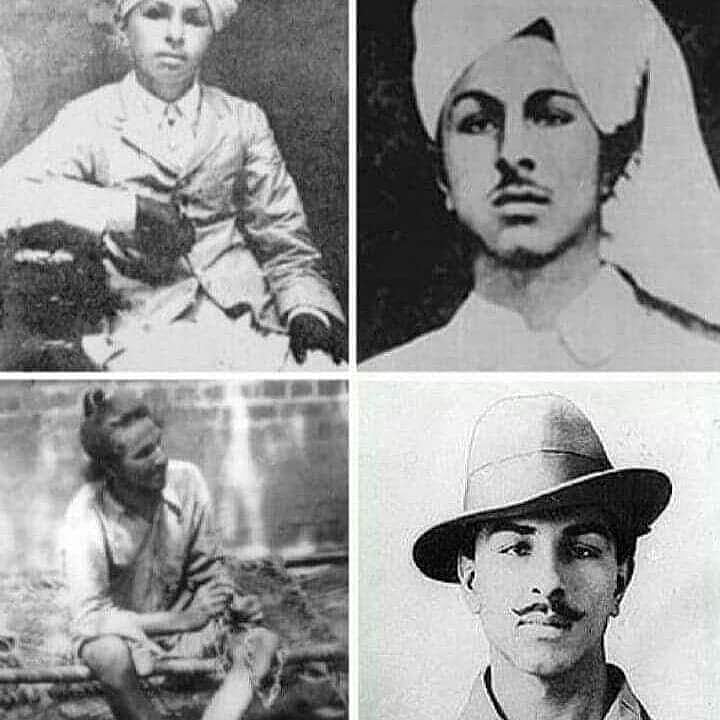Bhagat Singh would have been jailed as an ‘Urban Naxal’ by the Modi Government
Had Bhagat Singh, born on September 28 in 1907 and who was hanged at the age of 24 in 1931, been alive, how would the present Government have treated the ‘communist’ revolutionary?

Bhagat Singh continues to be ritually worshipped twice every year i.e. on his birth anniversary and his martyrdom day. This ‘hero’ worship of Bhagat Singh and other revolutionaries emanates from them being seen as youngsters who embraced martyrdom at a young age while fighting for their conviction and to free their motherland. They did hurl bombs in the central assembly to make the deaf hear. But the image of revolutionaries as daredevils is divorced from their ideology, beliefs and political program in popular imagination.
The BJP and the RSS and Hindutva forces have left no stone unturned to appropriate Bhagat Singh and other revolutionaries in their fold. The veneration they enjoy in Indian society explains the eagerness of the BJP-RSS to appropriate revolutionaries. But Bhagat Singh’s writings continue to be anathema to them
On communalism, role of religion and the media, Bhagat Singh had this to say: “During these times, the role of communal leaders and newspapers have also been observed in instigating these riots…the other instrument of fomenting and inciting communal violence are the people writing for the newspapers…These people write against another community with big bold headlines which provoke constant feeling of hatred and enmity among communities…”
“The real duty of the newspapers was to educate, to cleanse the minds of people, take them out of the rut of narrow sectarian grooves of thought and perception, and to wash and scrap out communal feelings in order to invest them with feelings of amity and communal harmony, to bridge the gap and build mutual trust, bring about real rapprochement for advancing the cause of “common nationalism” but they have been doing exactly the opposite, leading to the division in the objective of “common nationalism…This is the very reason that makes me cry tears of blood when I think of present India…”.
These lines appeared in Kirti Magazine in 1927 under the headline, ‘Communal Riots and their solution’ and perfectly resonates with the present day reality when mainstream media stand hand-in-gloves with communal leaders.
The Manifesto of the Naujawan Bharat Sabha, which Bhagat and Bhagwati Charan Vohra wrote jointly, had posed a question before the then youth of the Nation:
“…We Indians, what are we doing? A branch of peepal tree is cut and religious feelings of the Hindus are injured. A corner of a paper idol, tazia, is broken, and ‘Allah’ gets enraged…Man ought to be attached more importance than animals and, yet, here in India, they break each other’s heads in the name of ‘sacred animals’”.

Workers, Farmers and Dissent: Why did Bhagat Singh and Batukeshwar Dutt hurl smoke bombs in the Central Legislative Assembly on behalf of Hindustan Socialist Revolutionary Association (HSRA)? Bhagat Singh and Batukeshwar Dutt also threw a pamphlet and shouted three slogans; Long Live Socialism, Down with Imperialism and Inqulaab Zindabad!
‘The Red Pamphlet’, which they threw in the Assembly read, “It takes a loud voice to make the deaf hear”. It added that smoke bombs were hurled to protest against British Government’s “attempt to thrust new repressive measures like the Public Safety and the Trade Disputes Bill, and reserving the Press Sedition Bill for the next session…upon the masses of India”. The two bills referred earlier attacked the working classes in India and called for deportation of working-class leaders and declared strikes as illegal terming them as ‘munity against the administration’. The Press Sedition Bill was a direct attack on Freedom of speech and expression.
If we consider this act of hurling smoke bombs in Central assembly in the present-day context, the Indian Government is doing precisely what Bhagat Singh and his comrades were protesting against.
The BJP Government has just passed four Labour code Bills and three Farm Bills in the Monsoon session of Parliament by ignoring protests by trade unions, farmers’ unions and the opposition. The ruling dispensation is also as repressive as colonial rulers then. They are as intolerant of dissent as the British were.
Caste: Bhagat Singh wrote an article attacking Caste and untouchability titled “Problem of Untouchability” in 1928 and another titled ‘Why I am an Atheist’ in 1930. In both these articles, apart from attacking religion in general, Bhagat Singh criticised Hinduism in particular for its caste system by making references to ‘sacred’ book like Vedas and Puranas.
He called the Brahmins, “haughty and egoist” who had deliberately kept people ignorant by forbidding education to them and instituted punishment like pouring hot lead in their ears if they heard a few sentences of your Sacred Books of learning —the Vedas.
Bhagat Singh in a letter to his mother wrote, “I have no doubt that my country will be one day free. But I am afraid that brown sahibs are going to sit in the chairs the white sahibs will vacate”.
He was what the present ruling dispensation would call an ‘Urban Naxal’; a university student and a left intellectual- activist; he despised communalism, upheld secularism and critiqued religion; he talked about overthrowing Capitalism, Feudalism and Imperialism.
If he were alive, the Hindutva bandwagon would have hounded him. He would have been called part of a ‘Tukde-Tukde’ gang, an ‘anti-national’, a ‘pseudo-secular’, an ‘urban Naxal’, anti-Hindu etc.
Follow us on: Facebook, Twitter, Google News, Instagram
Join our official telegram channel (@nationalherald) and stay updated with the latest headlines